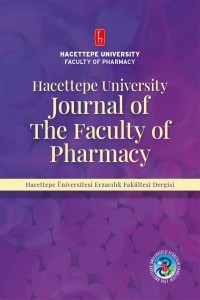Serbest Eczanelerde Zaman Alan İşler ve Hasta Danışmanlığı: Nitel Bir Çalışmadan Bulgular
Eczacılık uygulamaları, ilaç fiyatlandırma, geri ödeme, sağlık politikaları, iş yükü, farmasötik bakım
Time consuming work and patient consultancy in community pharmacies: Findings from a qualitative study
Pharmacy practice, pharmaceutical pricing, reimbursement, health policy, workload, pharmaceutical care,
___
- 1. Schommer, J.: Pharmacist workload and time management, Drug Topics, 4, 45 (2001).
- 2. Holland, R.W., Nimmo, V.M.: Transitions part 1, beyond pharmaceutical care. Am J Health Syst Pharm, 56, 1758–64 (1999).
- 3. Indritz, M.E.S., Artz M.B.: Value added to health by pharmacists. Soc Sci Med, 48, 647–60 (1999).
- 4. Hepler CD, Strand L.: Opportunities and responsibilities in pharmaceutical care. Am J Hosp Pharm, 47, 533–43 (1990).
- 5. Mark, M.P.: The general pharmacy work explored in The Netherlands, Pharm World Sci, 30, 353-359 (2008).
- 6. Anderson, C.: Health promotion in community pharmacy: the UK situation, Patient Educ Couns, 39, 285-291 (2000).
- 7. Official gazette: The Law No. 6197 (1953).
- 8. SGK: İlaç Katılım Payı (2012). http://www.sgk.gov.tr/wps/portal/tr/genel_saglik_ sigortasi/ilac_ve_eczacilik/ilac_katilim_payi (07.03.2014).
- 9. SGK: Eşdeğer İlaç Uygulaması (2012). http://www.sgk.gov.tr/wps/portal/tr/genel_ saglik_sigortasi/ilac_ve_eczacilik/ilac_katilim_payi (20.08.2014).
- 10. Tatar, M., Mollahaliloğlu, S., Şahin, B., Aydın, S., Maresso, A., Hernandez-Quevedo, C.: Turkey: Health system review, Health Syst Transit, 13, 1-186, xiii-xiv (2011).
- 11. Gümüş, E.: Türkiye’de Sosyal Güvenlik Sistemi: Mevcut durum, sorunlar ve öneriler, Seta Analiz, 24, 1-24 (2010).
- 12. Artıran, G., Akbulat, A., Vural, İ.M., Vural, E. H., Babacan, S, Doğan, E. ve diğerleri: Kamu Müdahalelerinin 2008-2013 Dönemindeki Değer Bazında İlk 100 İlaç Üzerine Etkilerinin Analizi, Sağlık Teknolojileri Değerlendirme Raporu-I, Ankara, TİTCK, (2014), 22. http://www.iegm.gov.tr/PortalAdmin/Uploads/UnitPageAttachment/ fbdd4d8d68518.pdf (15.08.2014)
- 13. İstanbul Eczacı Odası: Hükümet İlaç Sanayisi ile Anlaştı, Fatura Yine Eczacıya Çıktı, (2010). http://www.istanbuleczaciodasi.org.tr/htmlprint.php?type=haberler&id=3746 (14.08.2014)
- 14. SGK: Tebliğler, (2014) http://www.sgk.gov.tr/wps/portal/tr/mevzuat/yururlukteki_ mevzuat/tebligler (09.03.2014)
- 15. SGK: Muayene Katılım Payı, (2012). http://www.sgk.gov.tr (07.03.2014).
- 16. Sonhaber: Devletin kestiği 10 TL lik muayene ücreti eczacı ile vatandaşı karşı karşıya getiriyor, (2008). http://www.sondakika.com/haber-devletin-kestigi-10-ytl-likmuayene-ucreti-eczaci/ (06.04.2014).
- 17. Seston, E., Nicolson, M., Hassel, K., Cantril, J., Noyce, P.: Not just someone stood behind the counter, the views and experiences of medicines counter assistants, J Soc Adm Pharm, 18, 122-128 (2001).
- 18. Tully, M.P., Hassell, K., Noyce, P.: Advice-giving in community pharmacies in the UK, J Health Serv Res Policy, 2, 38-50 (1997).
- 19. Guion, L.A., Diahl, D.C., McDonald, D.: Conducting An In-depth Interview (FCS6012) University of Florida: Florida (2011), 1. https://edis.ifas.ufl.edu/pdffiles/FY/FY39300. pdf (05.05.2014)
- 20. Boyce, C., Neale, P.: Conducting In-depth Interviews: A Guide For Designing and Conducting In-depth Interviews For Evaluation Input (05/06/500). Pathfinder International, MA, (2006), 3-4. http://www.cpc.unc.edu/measure/training/materials/ data-quality-portuguese/m_e_tool_series_indepth_interviews.pdf (05.05.2014)
- 21. Patton, M., Qualitative evaluation and research methods. Beverly Hills, CA, Sage, 1990, 169-186. http://legacy.oise.utoronto.ca/research/field-centres/ross/ctl1014/ Patton1990.pdf (14.08.2014).
- 22. Evaluation Toolbox: Semi-structured Interview, (2010). http://evaluationtoolbox.net. au/index.php?option=com_content&view=article&id=31&Itemid=137 (08.04.2014).
- 23. Yeğenoğlu S, Baydar T.: Serbest Eczacıların Geriatrik Hastalara İlişkin Bilgi ve Gözlemleri: Ankara Şehrinde Kalitatif Bir Araştırma, Turk J Geriatr, 14(4), 344-351 (2011).
- 24. Çalgan, Z., Aslan, D., Yeğenoğlu, S.: Serbest eczacıların çalışma koşulları ve mesleki tutumlarına ilişkin değerlendirmeler: Ankara kent merkezi örneği, Ankara Ecz Fak Derg, 37(4), 257-268 (2008).
- 25. Adana Eczacı Odası: SGK Şubat 2010 Faturaları-İTS ve MEDULA Reçete Provizyon Sistemi Hakkında (2010). http://www.adanaeo.org.tr/mobil/index.php?p=h&no=2930 (19.08.14).
- 26. FIP: Good Pharmacy Practice (GPP) in Developing Countries (1997). http://www.fip. org/files/fip/Statements/latest/Dossier%20003%20total.PDF (07.05.2014)
- 27. Sancar, M., Okuyan, B., Apikoglu-Rabus, S., Izzettin, F.V.: Opinion and knowledge towards pharmaceutical care of the pharmacists participated in clinical pharmacy and pharmaceutical care continuing education program, TJPS, 10(2), 245-254 (2013). 28. Ngorsuraches, S., Li, S.C.: Thai pharmacists’ understanding, attitudes, and perceived barriers related to providing pharmaceutical care, Am J Health Syst Pharm, 63, 2144- 2150 (2006).
- 29. Cordina, M., McElnay, J.C., Hughes, C.M.: The importance that community pharmacists in Malta place on the introduction of pharmaceutical care, Pharm World Sci 21, 69-73 (1999).
- 30. Rossing, C., Hansen, E.H., Krass, I.: Barriers and facilitators in pharmaceutical care: perceptions and experiences among Danish community pharmacies, J Soc Adm Pharm, 19, 55-64 (2001).
- 31. Dunlop, J.A., Shaw, J.P.: Community pharmacists’ perspectives on pharmaceutical care implementation in New Zealand, Pharm World Sci, 24, 224-230 (2002).
- 32. Adepu, R., Shariff. A.: Development, validation and implementation of continuous professional development programmes for community pharmacists, Indian J Pharm Sci, 72(5), 557-563 (2010).
- 33. Rossing, C., Hansen, E.H., Traulsen, J.M., Krass, I.: Actual and perceived provision of pharmaceutical care in Danish community pharmacies: the pharmacists’ opinions, Pharm World Sci, 27, 175-181 (2005).
- 34. TEB: SGK tarafından yayınlanan e-reçete konulu duyuru hakkında (2013). http:// eski.teb.org.tr/index_.php?modul=haberdetay&id=1177494 (07.03.2014).
- Yayın Aralığı: 2
- Başlangıç: 1981
- Yayıncı: Hacettepe Üniversitesi Eczacılık Fakültesi Dekanlığı
Alkilanilinlerin Toksik Etkileri
Serbest Eczanelerde Zaman Alan İşler ve Hasta Danışmanlığı: Nitel Bir Çalışmadan Bulgular
Zeynep ÇALGAN, Selen YEĞENOĞLU
Beyine İlaç Tașınması: Truva Atı Teknolojisi
Selin S. DOĞAN, Seçil TOKTAŞ, Yılmaz ÇAPAN
Merve BACANLI, Hatice Gül GÖKTAŞ, Zehra SARIGÖL, Sevtap AYDIN, A. Ahmet BAŞARAN, Nurşen BAŞARAN
Alchemilla L. Türlerinin Kimyasal Bileșikleri ve Biyolojik Aktiviteleri
